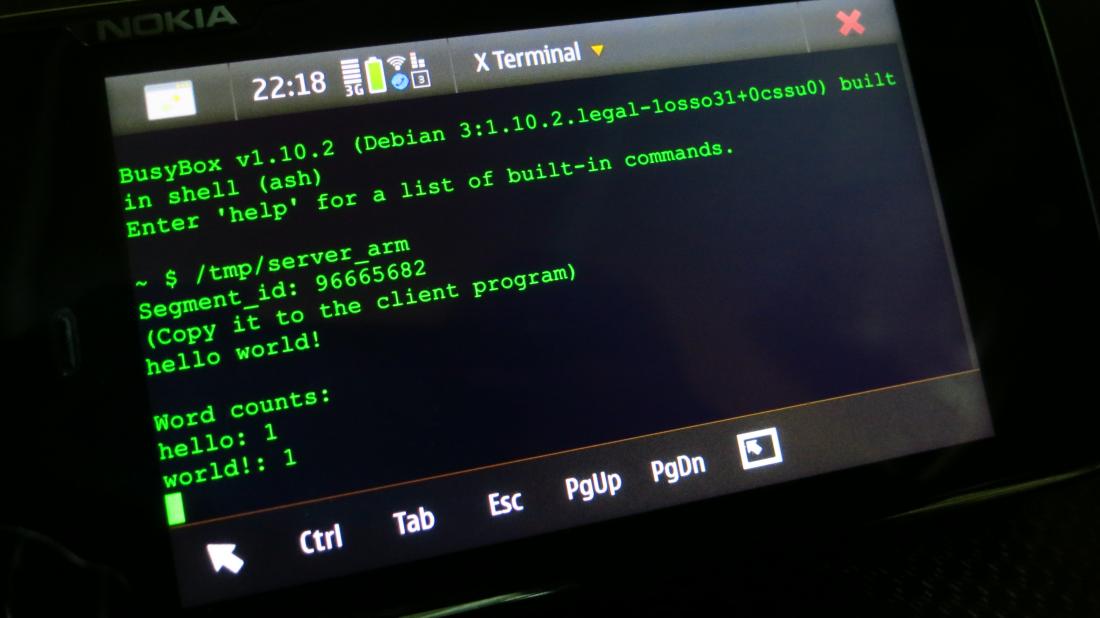 |
| ARM CPU也可以運行的 |
題目:
使用Linux以共享記憶體做兩process之溝通
- A程式接受user輸入英文word,然後將英文word存入共享記憶體
- B程式從share memory陸續讀出英文word,並且將它們排序,及統計出現次數
- 當A程式存入特殊字元'#'至共享記憶體時,B程式要把目前收集的英文word依序排序結果(包含次數資料輸出)
繳交期限 : 2012/11/23(五)
繳交內容 : 程式執行碼 & 說明文件(也可以直接寫在程式碼內)
My answer:
可以參考書第3章
因為沒有使用有C++,全部使用沒有物件導向功能的ANSI C語法,所以有很長的程式碼都是在寫link-list。
我的Server部分程式碼:
#include <stdio.h>
#include <sys/shm.h>
#include <sys/stat.h>
#include <string.h>
#include <stdlib.h>
#define size 140
struct packet_data {
char data[size];
short locked;
};
struct data_list { //store the string
char data[size];
int count;
struct data_list *next;
};
int main(void) {
struct packet_data *shared_memory;
struct data_list *first=NULL,*previous,*current,*new_data;
int segment_id;
segment_id = shmget(IPC_PRIVATE, sizeof(struct packet_data), S_IRUSR | S_IWUSR); //allocate a shared memory segment
shared_memory = (struct packet_data*) shmat(segment_id, NULL, 0); //attach the shared memory segment
shared_memory->locked = 0;
printf("Segment_id: %d\n(Copy it to the client program)\n", segment_id);
while (1) {
if (shared_memory->locked) {
if(!strcmp(shared_memory->data,"exit")) { //exit
shmdt(shared_memory); //now detach the shared memory segment
shmctl(segment_id, IPC_RMID, NULL); //now remove the shared memory segment
return 0;
} else if (!strcmp(shared_memory->data,"#")) { //#
printf("\n\nWord counts:\n");
current=first;
while (current!=NULL) {
printf("%s: %d\n",current->data,current->count);
current=current->next;
}
}else{
printf("%s ",shared_memory->data);
fflush(stdout);
new_data=(struct data_list*) malloc(sizeof(struct data_list));
strcpy(new_data->data,shared_memory->data);
new_data->count=1;
new_data->next=NULL;
if (first==NULL)
first=new_data;
else if (strcmp(shared_memory->data,first->data)<0) {
//if it's smaller than first node
new_data->next=first;
first=new_data;
} else {
current=previous=first;
while (current!=NULL) //search until the end
if (strcmp(shared_memory->data,current->data)>0) {
previous=current;
current=previous->next;
} else break;
if (current==NULL) //shared_memory->data is the biggest
previous->next=new_data;
else if (strcmp(shared_memory->data,current->data)==0) { //On the list
current->count+=1;
free(new_data);
} else { //Not found, add to the list in order
new_data->next=previous->next;
previous->next=new_data;
}
}
}
shared_memory->locked=0;
}
system("sleep 0.1"); //save battery, you can remove it
}
return 0;
}
//u.livekn.com 2012/11/22
Client部分程式碼:
#include <stdio.h>
#include <sys/shm.h>
#include <sys/stat.h>
#include <string.h>
#include <stdlib.h>
#define size 140 //The size of shared memory segment (in byte)
struct packet_data {
char data[size];
short locked;
};
int main(void) {
int segment_id; //The identifier for the shared memory segment
struct packet_data *shared_memory;
char user_input[size];
printf("Enter the segment_id: ");
scanf(" %d",&segment_id);
shared_memory = (struct packet_data*) shmat(segment_id, NULL, 0); //attach the shared memory segment
printf("Type someting:\n");
while(1) {
if (!shared_memory->locked) {
scanf(" %140s",user_input);
strncpy(shared_memory->data,user_input,size);
shared_memory->locked =1;
system("sleep 0.5"); //save battery
}
if (!strcmp(user_input,"exit")) //break the loop when user input "exit"
break;
}
shmdt(shared_memory); //detach the shared memory segment
return 0;
}
//u.livekn.com 2012/11/22
使用方法:
- 運行server
- 運行client
- 把server顯示的Segment_id複制到client上
- 在client輸入文字,server會自動顯示
- 在client輸入#,server會顯示各字出現次數
- 在client輸入exit,自動結束
已編譯版本:
沒有留言:
張貼留言